My Best Day in Ministry: The Day I Was Used Most by God
Dan Trumble, a managerial accountant in Finance Business Partner Support, tells a story of one man’s salvation brought about in a way that only God can orchestrate.
Continue Reading ›Meet Compassion Rwanda’s Eugene Bahire
As birds sing morning songs to begin their days, Eugene Bahire, in charge of Tours and Visits at Compassion’s Rwanda office, starts his day with a morning prayer at 5:30 and prepares himself for work.
He leaves home at 6:30 a.m. and takes 45 minutes to reach his office.
After morning devotions with all Compassion Rwanda staff, which normally start at 8 a.m. and last an hour, he shifts his focus to Tours and Visits communications. 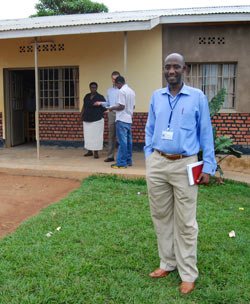
“I make sure that I have enough relevant information about the child before confirming a visit date for a sponsor or a tour.
“Having gotten the news that a child will be visited on a certain date, the student center social worker visits the child’s home ahead of time to prepare the family members or guardians living with the child, and of course some preparations are made at the student center as well.”
Eugene enjoys his job, which he longed for even while he was still at the university.
“Ever since my university time, my ambitions were to work for a Christian organization, and so this is an absolute answer of prayer to me.
“I am always happy and motivated to advocate for people in times of need, and I enjoy learning about different cultural values.”
Gifted with cultural diversity, mostly resulting from his country’s (Rwanda) history, Eugene was born in Uganda in 1976, where he had his primary education. He later moved to join his brother who was living in Kenya, and from there had his junior secondary education. (more…)
Continue Reading ›My Best Day in Ministry: Compassion Over the Past 10 Years
Jacob Kitonsa began working for Compassion in Uganda in 1999. He currently works in our International Program Group as a Senior Leadership Development Program Specialist.
Richmond Wandera: My Best Day in Ministry
Moody Bible Institute scholar Richmond Wandera shares how the telling of his story and one woman’s response to it reminded him that child sponsorship is a part of God’s work.
My Best Day in Ministry: Praying for God’s Purpose
Joseph Mayala is the Compassion Tanzania Country Director. He shares about his best day in ministry, a day the Lord spoke to him.
Death of a Child
I still haven’t figured out a great way to mourn Alfan’s death. It still makes me sad. I’m still overwhelmed by the tragedy of the death of a child. However, I cling to hope!
Life After the Leadership Development Program: A Voice for the Voiceless
As I look into my life, one thing stands true. God is faithful, and He knows the plan He has for each and every one of us. Jeremiah 29:11 has come true in my life.
I graduated in 2005 from Daystar University with a degree in community development. Upon graduating, I became a volunteer at my local child development center, helping Compassion kids with letter writing, doing devotions and sharing my Compassion story as a way of encouraging them.
I also worked on a part-time basis with Compassion Kenya as a research assistant. Among the research I helped coordinate was a study on the impact of Compassion’s programs on its graduates.
Between July to October 2006, God opened an opportunity through Compassion for me to be a voice for the voiceless in various venues and forums throughout the United States, speaking on behalf of children living in poverty in today’s world, drawing upon my experiences as a former participant in Compassion’s sponsorship program. 
My role as an ambassador was to speak on behalf of Compassion International in seeking to acquire new sponsorships and deepen the level of trust among current sponsors and donors.
I thank God, because more than 1,000 new sponsorships were acquired during the speaking engagements in the United States.
In February 2008, I had the opportunity to engage in a series of speaking engagements with Tear Fund NZ. I was hosted as a guest in one of the Christian media houses during Compassion Day and also spoke in different churches and institutions on the need and benefit of child sponsorship.
God has been preparing me to embrace a great vision; I thank God for ordering my steps in life. I am currently working as a community development manager with a nonprofit based in Kenya with its head offices in Atlanta: 410 Bridge Ministry.
- Read the July 2007 LDP Newsflash featuring Paul’s post-LDP work at 410 Bridge Ministry.
I have observed with varying degrees of frustration how lack of Godly leadership has plunged Africa into a myriad of problems, as children continue to suffer innocently and give up on their dreams.
I am ready to be used by God to transform Africa to become a continent after God’s heart.
I believe that each child should be given an opportunity to live his or her dream; we should not allow poverty to rob, crush and destroy the God-given potential of any child. Those who do not live their dreams often become cynical about their future as poverty robs them of childhood hopes and expectations.
I consider myself a voice for the voiceless, bearing testimony to the biblical truths that God has the best plan for children. It goes without saying that if you invest in the life of a child, you touch a family. If you touch a family, you transform the society. If you transform the society, you change the nation. And if you change a nation, you make the world a better place to live in.
*This content honors our historical Leadership Development Program. To learn more about our current youth development opportunities, click here.
Leadership Development Program: A Dream Opportunity
From yesterday’s post:
By the time I had completed high school, I did not know what the next step would be for me, because in Kenya at the age of 18 years I was due for graduation from the Compassion program and that was it.
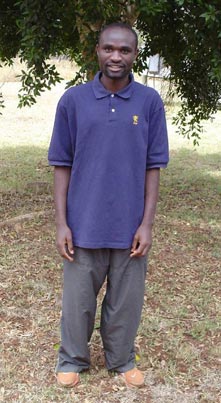 I heard of the Leadership Development Program* (LDP) from the social workers at the child development center at a time that I was praying and trusting in God to take me to college.
I heard of the Leadership Development Program* (LDP) from the social workers at the child development center at a time that I was praying and trusting in God to take me to college.
I had done well in my exams, and Compassion was looking for young outstanding Christian men and women who had been through the Child Sponsorship Program to develop through educating, training and discipling them into servant leaders.
The aim was to equip the people to impact their community in their various spheres of influence.
I thought this would give me an opportunity to pursue my dream. I did not hesitate to apply after getting the recommendation letters from my pastor and social worker at the program center.
The challenge was that the Leadership Development Program in Kenya could only take 20 students, yet there were many child development centers in Kenya with equally outstanding Christian young men and women with great potential.
The interviews were vigorous; candidates were to exhibit Christ-like character, commitment to a local church, outstanding academic performance, and leadership ability, among other things.
Joining the program as one of the first 20 students in LDP-Kenya was nothing short of a miracle.
I remember joining Daystar University in Kenya to pursue a degree in community development. That was a great achievement not only for me, but also for my family, church and community. So many people started looking up to me to help them make decisions in almost all areas of life.
The church had me serve in Sunday School, Mission and Outreach Board, School Board and Clinic Board. My dad made a habit of consulting me always in the major decisions that concerned the family — that is not so common in Kenya.
Missions and outreach activities that were organized by LDP-Kenya in rural parts of the country are memories that I still hold dear, even after graduating from the program.
We would go to the villages as LDP students, do door-to-door evangelism and do community service like helping with digging, washing clothes and dishes, and fetching water and firewood.
The most exciting moments were seeing the villagers come to accept Christ as Lord and Savior of their lives. They were often humbled by the way university students would come to their level and just be friends.
Being linked to a mentor to walk me through my spiritual and career life was also something memorable. Training workshops organized by Compassion and also opportunities to meet other LDP students from neighboring countries like Uganda and Ethiopia are memories that will not fade easily.
The opportunity to serve as the first LDP-Kenya student leader was a good training ground for me in taking up future leadership roles in the community, the country and Africa — transforming lives of many in a godly way.
Still as LDP students, we undertook to sponsor a girl from another country through Compassion as a sign of giving back; we still sponsor the young girl — from sponsored children to sponsors of children!
Finally, winning a scholarship for an exchange program between Daystar University and Gordon College in Wenham, Massachusetts, for a semester in 2003 was a life-changing experience as well that I am grateful to God for.
*This content honors our historical Leadership Development Program. To learn more about our current youth development opportunities, click here.
Life as a Sponsored Child (Part II)
From yesterday’s post:
I was among the first lucky ones to get a sponsor, and when I did I had a new family — the Pendleton Browns from Atlanta, Georgia.
Every Saturday I attended the Compassion Saturday program. When I was first enrolled I knew for sure the weekly meetings would interfere with my soccer time, which was also on Saturdays. But when sports were introduced I became comfortable with the idea of attending.
As a kid, I often played at the dumping site and scavenged for edibles that the various companies and airlines disposed of at the site. My friends and I named the dumping site “Chombo.” Chombo is a Swahili word meaning machine.
We named the dump “Chombo” because we found biscuits disposed of by factories that the machine did not cut into the correct shape. Most boys ended up not going to school, but found a home in “Chombo.”
Not many kids made it to high school in my neighborhood, basically because of two reasons; one, to make it to high school, there is a national exam that one has to take. Passing this exam is not easy as such, and if one never makes it in the exam, then there is no place for him or her in high school.
Another reason is that, even if some make it in the exam, they fail to join high school because they cannot afford the school fees.
I thank God for Compassion because it ensured that my school fees were paid for in high school. My sponsor family also encouraged and believed in me, hence I did so well in my exams and joined a government high school.
Some of the kids I grew up with did not get the opportunity to join high school. Most boys went into drug addiction and to nurse their drug addiction, they turned to crime.
Ladies turned to prostitution, and most of them had babies as early as 14 years old.
I saw more than 15 boys I grew up with either being shot down by the police or being stoned to death by mob justice. The community was just fed up with crime and took the law into its own hands.
An event that turned my life is when I saw one of the young men I grew up with and even shared classes with being chased down the streets. Later, the crowd caught up with him, stoned him to death, and set his body ablaze.
I later learned that this young man had stolen an electronic gadget worth maybe less than $100. It saddened me seeing my friend die in the hands of an angry mob.
For a long time I blamed myself for not sharing my faith with him. I resolved to join an evangelism and discipleship class in church popularly known as Campus Crusade for Christ. Here I had opportunity to learn how to share my faith and I saw my friends come to Christ, though some rejected.
By the time I had completed high school, I did not know what the next step would be for me, because in Kenya at the age of 18 years I was due for graduation from the Compassion program and that was it.
For sure, high school education alone could not help me achieve my dreams. I became sad. I really had the desire to proceed with my education, but I knew without the help of Compassion I was not going to make it.
One thing surprised me, though; I did well again in my Kenya Certificate of Secondary Education exams. I became a role model in my community, and I often had parents send their kids to me to talk to them.
I had an interest in teaching kids in church; I found it fun singing with 8- and 9-year-olds and teaching them Bible stories. I also continued sharing my faith in the neighborhood through door-to-door evangelism.
Life as a Sponsored Child
From yesterday’s post:
Compassion staff decided to extend grace and enroll ages 4 to 12 years.
That was the moment I knew I was now completely netted. I could see my mother smiling broadly after the pronouncement. She had her fingers crossed all this time.
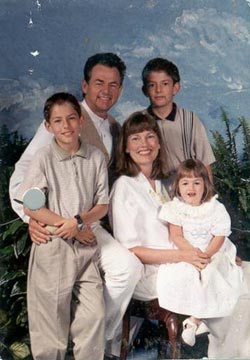 I was among the first lucky ones to get a sponsor, and when I did I had a new family — the Pendleton Browns from Atlanta, Georgia. I became a big brother.
I was among the first lucky ones to get a sponsor, and when I did I had a new family — the Pendleton Browns from Atlanta, Georgia. I became a big brother.
They had two sons: Eliakim, who was 5 at the time, and Ace, who was 4. Later my sister, Hossanah Joy Brown, was born.
I remember going to school with the family photo they had sent me, and when I showed it to my friends, they asked me, “Who are those?”
I answered them with so much joy — “My family in Atlanta!”
One of the kids gave me a mean look, then replied, “Hmm … they’re white and you’re black.”
Sure enough, it did not matter to me what color they were or what color I was not. All I knew is that I had found a family. I cherished every single letter they wrote me.
Every Saturday I attended the Compassion Saturday program. When I was first enrolled I knew for sure the weekly meetings would interfere with my soccer time, which was also on Saturdays. But when sports were introduced I became comfortable with the idea of attending.
I looked forward to receiving a letter or photo from my family, and if I did not get one, I went home unhappy thinking that maybe I did not do a good job in replying to their last letter.
Compassion took care of my educational needs by buying school uniforms, books, clothes and other necessities. This played a big role in restoring my self-image because I used to go to school in a torn pair of shorts that had patches all over and some of my classmates made fun of me.
Medical care was also provided by Compassion, which played a great role in ensuring that we had access to better medical facilities.
Health screenings at the child development center ensured monitoring of health conditions and those cases were referred to the medical facility before it was too late.
Spiritual development through the Saturday devotion program and Bible study at the child development center facilitated my decision to receive Christ as my personal Savior at the age of 15 when I was in high school.
I became an active Bible Study leader and during Compassion Sunday, I got a couple of opportunities to preach and share my testimony before the congregation in church.
During the vacation, the child development center organized camps, hikes and game park tours. My social life was now active through exposure from various activities offered by the center.
Life skills training also became an integral part of life at the child development center. I learned soon how to cook, weave and how to operate computer applications.
How I Came to Compassion
I believe all children growing up, regardless of which corner of the world they were born into, will always have a dream of what they want to be when they grow up. Some live their dream well; others are not lucky enough to live their dreams.
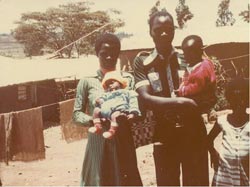 As a child, I held onto my dream despite the glaring poverty that threatened to kill it. I dreamed I would be some sort of a great leader when I grew up. My parents always reminded me that it would be important to work hard in school and trust in God in order for my dreams to come true.
As a child, I held onto my dream despite the glaring poverty that threatened to kill it. I dreamed I would be some sort of a great leader when I grew up. My parents always reminded me that it would be important to work hard in school and trust in God in order for my dreams to come true.
Childhood memories are still fresh in my mind. I grew up in a neighborhood of 10′ x 10′ shelters made out of sticks, mud walls and iron sheet roofs.
My father volunteered as a church planter in the slums while my mother made and sold African attire known as ‘Kitenge’ in a small market nearby.
I watched one of my sisters die at age 3. I was only about 4 years old then.
Many children die before the age of 5 in my community. Perhaps that explains why most parents have many children — they have to take chances because they aren’t sure which ones will make it.
I am one of five siblings that survived. My eldest sister is 32 years old and I am the second oldest. I have a younger sister who is 25 and a brother who is 24. My youngest sister is 19.
Infrastructure is a great challenge in my community. There are no nearby hospitals or schools, so we remained isolated from the rest of the world.
Without medical coverage, a hospital visit in the neighboring town reaps hefty hospital bills. It is particularly hard for parents who cannot find employment.
As a result, many parents avoid taking their children to hospital for fear of being detained in hospital if they can’t afford the fees.
Only in serious cases is anyone taken to hospital and, even then, transportation is a challenge. Some of them never make it in time and die on their way.
Bitter herbs are common for most illnesses, and as a kid I dreaded saying I was sick because it was hard to stomach the bitter herbs going down my throat.
Sanitation was and still remains a great challenge in Kibera.
Residents answer the call of nature in buckets in the comfort of their small houses and pack the waste in plastic bags, which they throw out of their windows at night. This practice led to the rise of a new term — “the flying toilets of Kibera.” Curfew hours begin at 8 p.m. in Kibera, and puu-puu begins flying through the windows.
My father believed that the reason he was living in abject poverty is because he never had the privilege of completing his high school education. He resolved to give his children good educations if he could.
My family eventually moved from Kibera to Dandora, about half an hour east of the city of Nairobi.
Dandora is known for being the largest dumping site in Kenya, where crime and all sorts of evil reigns. Dad relocated the family to Dandora because the government was setting up public schools there and he wanted us to be in a neighborhood with public schools.
When we moved to Dandora, I started schooling immediately. My dad, together with five other families, founded Dandora Baptist Church. (more…)
Can Anything Good Come Out of a Slum?
My biggest fear in life is not reaching my God-given potential. And for the first 20 years of my life, I found myself being increasingly shaped by worldly values. That is, until I came face to face with Jesus!
Since then my Creator and Saviour has been helping me to weed out values that are contrary to those of the Kingdom and walking with me towards the dreams He’s planted in my heart. It’s been a step-by-step process of learning to be faithful with what He entrusts me with.
Of course, going against the patterns of this world isn’t easy, but the fruit of obedience is liberating! I wouldn’t want to live any other way. Life’s exhilarating when you’re dancing with a God of the supernatural.
Thanks to modern technology, I met a Compassion alumnus Paul Omondi through Facebook! Paul shared his testimony with me … It’s more than encouraged me to be all that I can be; it’s given me hope.
Paul completed the Leadership Development Program in Kenya years ago (a program that educates, trains and disciples servant leaders), was recently married (congratulations Paul!), and now works to help his fellow Kenyans escape the cycle of poverty in his role as a Community Development Manager.
But every achievement starts with a heart that dares to dream.
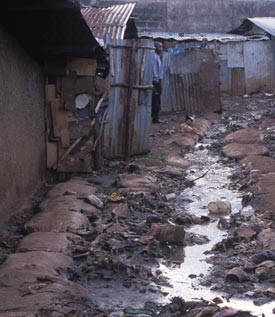
Twenty nine years ago in Kibera, 15 minutes outside of Nairobi, Kenya, a baby boy was born. Kibera is the biggest slum in Kenya. I can’t imagine what would’ve become of me if I was born there.
I’m reminded of the words of Nathanael when Philip told him that he had found ‘the one’ that Moses and the prophets wrote about. He said,
“Nazareth! Can anything good come from there?” — John 1:46a (NIV)
Can anything good come out of a slum?
Tune in all next week as Paul tells his story.
– Irene


